Politics
Trump Threatens Sanctions After Russia’s Largest Ukraine Airstrike
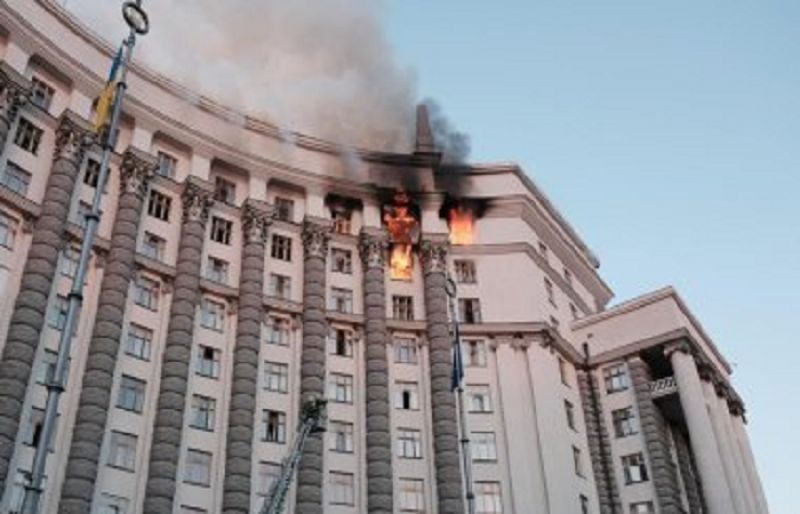

US President Donald Trump threatened Sunday to impose more sanctions on Russia, after the Kremlin unleashed its biggest-ever aerial barrage at Ukraine.
Russian missiles and drones rained down across Ukraine early Sunday, killing four people and setting government offices in the capital Kyiv ablaze. Trump told reporters after the assault he was “not happy with the whole situation” and said he was prepared to move forward on new sanctions on Moscow.
Ukrainian President Volodymyr Zelensky said he was counting on a “strong” US response. Russia has intensified its onslaught against Ukraine since a meeting between Trump and President Vladimir Putin on August 15 failed to make any breakthrough on a ceasefire.
After Sunday’s attack on Kyiv, flames could be seen rising from the roof of the sprawling government complex that houses Ukraine’s cabinet of ministers in the heart of the city — the first time it has been hit during the three-and-a-half-year conflict.
Drone strikes also damaged several high-rise buildings in the Ukrainian capital, according to emergency services.Russia denies targeting civilians in Ukraine. It said it struck a plant and a logistics hub in Kyiv, with the Russian defence ministry saying “no strikes were carried out on other targets within the boundaries of Kyiv”.
“It is important that there is a broad response from partners to this attack today,” said Zelensky in his evening address, adding that Putin was “testing the world”. “We are counting on a strong response from America. That is what is needed.”
Russia fired at least 810 drones and 13 missiles at Ukraine between late Saturday and early Sunday in a new record, according to the Ukrainian air force. Ukrainian Prime Minister Yulia Svyrydenko posted a video showing a damaged floor in the government building.
“We will restore the buildings,” she said. “But we cannot bring back lost lives. The enemy terrorises and kills our people every day throughout the country.” Zelensky discussed the attack in a call with French President Emmanuel Macron and said France would help Ukraine strengthen its defence.
Macron was among European leaders who condemned the attack, posting on X that Russia was “locking itself ever deeper into the logic of war and terror”. UK Prime Minister Keir Starmer denounced the attacks as “cowardly” while EU chief Ursula von der Leyen accused the Kremlin of “mocking diplomacy”.
Earlier, US Treasury Secretary Scott Bessent said Washington might slap tariffs on countries that buy Russian oil. The Russian economy will be in full collapse. And that will bring President (Vladimir) Putin to the table,” Bessent told NBC television.
At least two people were killed in a strike west of Kyiv, prosecutors said. More than two dozen were wounded in Kyiv, according to the emergency services.
Among them was a 24-year-old pregnant woman who delivered a premature baby shortly after the attack, with doctors fighting to save her life and that of her baby, state TV Suspilne reported.
Two more died and dozens were wounded in overnight strikes across the east and southeast, authorities said. Ukraine’s foreign ministry highlighted that seven horses had also been killed at an equestrian club. The world cannot stand aside while a terrorist state takes lives — human or animal — every single day,” it posted on X.
The barrage came after more than two dozen European countries pledged to oversee any agreement to end the war, some of which said they were willing to deploy troops on the ground.
Ukraine has insisted on Western-backed security guarantees to prevent future Russian attacks, but Putin has warned that any Western troops in Ukraine would be unacceptable and legitimate targets.
Trump has tried to find a way to end the war in recent weeks but has little to show for his efforts. Russia has continued to claim territory in costly grinding battles and now occupies around 20 percent of Ukraine. Tens of thousands have been killed and millions forced from their homes in Europe’s bloodiest conflict since World War II.
Politics
Trump-Zelensky talks yield no progress on Ukraine-Russia territorial issues
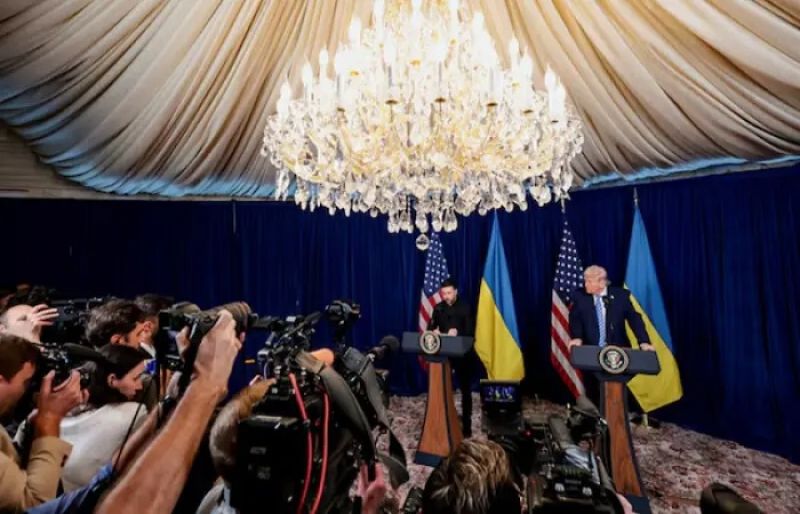

Russia and Ukraine on Monday remained far apart on territorial issues that are blocking a peace deal, despite progress on security guarantees for Kyiv at talks between US President Donald Trump and Ukrainian leader Volodymyr Zelensky.
Trump said after his talks with the Ukrainian president on Sunday that they were “getting a lot closer, maybe very close” to an agreement to end Russia’s war in Ukraine, but that “thorny issues” were still there.
Zelensky said two main issues outlined in a 20-point peace proposal remained to be resolved – control of Ukraine’s Zaporizhzhia nuclear power station, which is in Russian hands, and the fate of the Donbas area of eastern Ukraine.
“Two questions remain: the station – how will the station operate? – and the territory,” Zelensky told reporters on Monday.
Underlining how far apart Kyiv and Moscow are on territory, Kremlin spokesman Dmitry Peskov said Ukraine must withdraw its troops from the small part of Donbas that it still controls, and that Kyiv would lose more land if it did not agree to a deal.
“We are talking about the withdrawal of the regime’s armed forces from the Donbas,” Peskov said.
He said a call was planned soon between Trump and Russian President Vladimir Putin, but did not say when.
Security Guarantees
Trump’s decision to hold talks with Zelensky in Florida on Sunday had widely raised hopes of at least some progress being made towards ending what has become Europe’s deadliest conflict since World War Two.
Russia controls about a fifth of Ukraine, including the Crimean peninsula, which it annexed in 2014. It claims Donbas – comprising the Donetsk and Luhansk regions – as well as the Zaporizhzhia and Kherson regions, although they are all internationally recognised as Ukraine’s sovereign territory.
Russia wants Kyiv to withdraw troops from parts of the Donetsk region it has failed to occupy in four years of war since its invasion of Ukraine in February 2022. Kyiv wants fighting halted along the current front lines, and Washington has proposed a free economic zone if Ukraine pulls troops back.
“There is no detailed concept for a free economic zone yet,” Zelensky said.
Russia has rejected the idea of a ceasefire to allow a referendum to be held on any territorial concessions by Ukraine.
One sign of progress on Sunday came when Zelensky said a bilateral agreement had been reached on security guarantees for Kyiv, although Trump said they were only 95pc ready.
“I told (Trump) that we have been at war for almost 15 years, and would very much like the guarantees to be for longer,” Zelensky said, adding that he had asked Trump to consider a security deal for up to 50 years.
Trump said on Sunday he expected European countries to “take over a big part” of that effort with US backing. Agreement on such moves could be complicated, as Russia has said any foreign troop deployment in Ukraine would be unacceptable.
French President Emmanuel Macron said progress was being made on security guarantees, and countries in the so-called “Coalition of the Willing” would meet in Paris in early January to “finalise concrete contributions”.
Trust between Russia and Ukraine is low.
Despite the recent peace overtures and some exchanges of prisoners of war, mistrust runs deep between Ukraine and Russia.
Russia launched a heavy attack on Ukraine before the talks in Florida began, and has stepped up attacks on Ukraine’s energy facilities as winter approached. Large parts of the capital Kyiv were without power on Monday after the strike, as temperatures were below freezing.
Trump repeated on Sunday, after his call with Putin, that he believed the Russian leader wants the war to end.
“In my opinion, (Putin’s) actions do not coincide with the seemingly peaceful rhetoric he uses in his dialogue with the US president,” Zelensky said, questioning Putin’s commitment to peace.
Zelensky said he was open to any format of communication with Russia, and a meeting would be possible after Trump and European leaders agree on the framework for peace. Peskov said no call between Putin and Zelensky was being discussed.
Putin has said Russia will achieve its aims in Ukraine by force if Kyiv does not want to resolve the conflict diplomatically – making clear it must accept Moscow’s demands.
Several Ukrainians who spoke to Reuters in Kyiv on Monday voiced scepticism about prospects for a lasting peace.
“Putin doesn’t need territory; he doesn’t need Donbas — he wants to destroy the Ukrainians. He destroys us as a nation,” said Nadiia Yevtushenko, a 57-year-old Kyiv resident.
Politics
Three Turkish police officers, six Daesh militants killed in clash, amid national crackdown
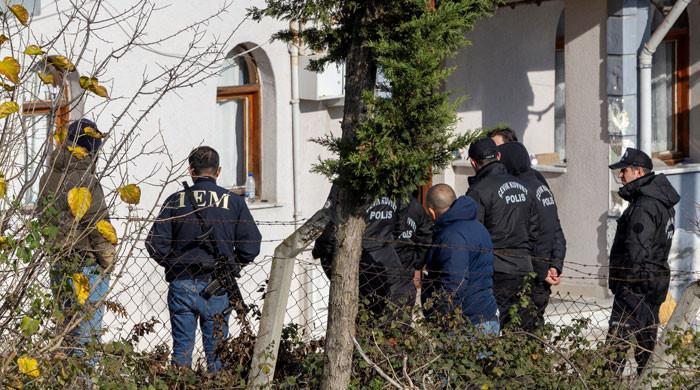
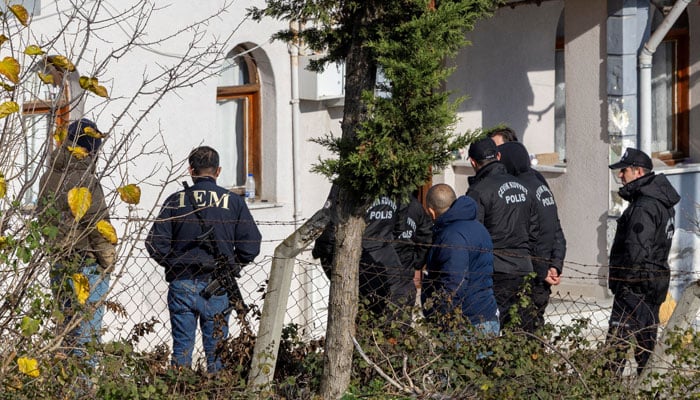
- All six militants were Turkish citizens, says minister.
- Turkey arresteded 138 Daesh suspects last month.
- 108 addresses raided across Turkey early on Monday.
YALOVA: Three Turkish police officers and six Daesh militants were killed in a gunfight in northwest Turkey on Monday, the Interior Minister said, a week after more than 100 suspected Daesh members were detained for planning Christmas and New Year attacks.
Interior Minister Ali Yerlikaya said eight police and another security force member were wounded in a raid on a property in the town of Yalova, on the Sea of Marmara coast south of Istanbul. More than 100 addresses were raided nationwide early on Monday.
Turkey has stepped up operations against suspected Daesh militants this year, as the group returns to prominence globally.
The US carried out a strike against the militants in northwest Nigeria last week, while two gunmen who attacked a Hanukkah event at Sydney’s Bondi Beach this month appeared to be inspired by Daesh, Australian police have said.
On December 19, the US military launched large-scale strikes against dozens of Daesh targets in Syria in retaliation for an attack on American personnel.
Raid lated hours
Police raided the house in Yalova on the suspicion that militants were hiding there overnight. Sporadic gunfire was heard during the operation, which lasted nearly eight hours, according to a Reuters photographer at the scene.
Last week, Turkish police detained 115 suspected Daesh members they said were planning to carry out attacks on Christmas and New Year celebrations in the country.
Yerlikaya told reporters that the militants killed in Monday’s attack were all Turkish citizens, adding that five women and six children were brought out of the property alive.
In the last month, police arrested a total of 138 Daesh suspects and carried out simultaneous operations on Monday morning at 108 different addresses in 15 provinces, he added.
In a post on X, President Tayyip Erdogan offered his condolences to the families of the police officers killed, and said Turkey’s fight with “the bloody-handed villains who threaten the peace of our people and security of our state” will continue “both within our borders and beyond them.”
Wave of Daesh attacks in 2015-17
Police had sealed off the road approaching the house in the early hours and smoke was visible rising from a nearby fire, while a police helicopter flew overhead.
The Istanbul chief prosecutor’s office said last week that Daesh militants were planning attacks against non-Muslims in particular.
Almost a decade ago, the militant group was blamed for a series of attacks on civilian targets in Turkey, including gun attacks on an Istanbul nightclub and the city’s main airport, killing dozens of people.
Turkey was a key transit point for foreign fighters, including those of Daesh, entering and leaving Syria during the war there.
Police have carried out regular operations against the group in subsequent years and there have been few attacks since the wave of violence between 2015-2017.
Politics
Indonesia nursing home fire kills 16: official

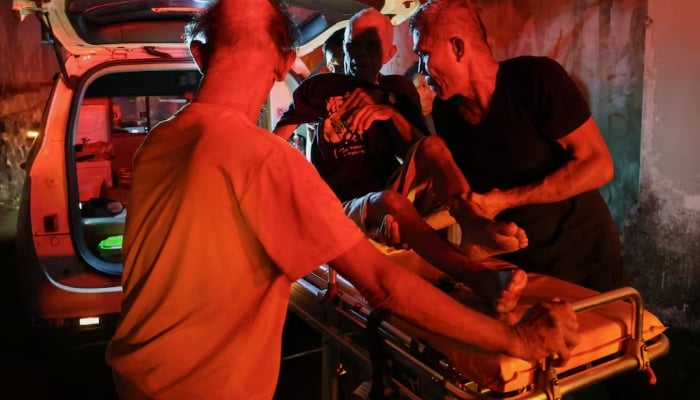
A fire at a nursing home on the Indonesian island of Sulawesi killed more than a dozen people, with three others injured, a local official said Monday.
Firefighters received the report of the blaze at 8:31pm Sunday at a nursing home in the North Sulawesi provincial capital Manado, said the city’s fire and rescue agency chief Jimmy Rotinsulu.
“There were 16 deaths; three (people) had burn injuries,” he told AFP.
Many bodies of the victims were found inside their rooms, Jimmy said, adding that many of the elderly residents were likely resting in their rooms in the evening when the fire broke out.
Authorities managed to evacuate 12 people — all unhurt — and transfer them to a local hospital, he said.
Footage aired by local broadcaster Metro TV showed the fire engulfing the nursing home, while locals helped to evacuate an elderly person.
Deadly fires are not uncommon in Indonesia, a Southeast Asian archipelago of more than 17,000 islands.
A fire tore through a seven-storey office building in Indonesia´s capital Jakarta this month, killing at least 22 people.
In 2023, at least 12 people were killed in the country´s east after an explosion at a nickel-processing plant.
-

 Sports3 days ago
Sports3 days agoBrooks Koepka should face penalty if he rejoins PGA Tour, golf pundit says
-
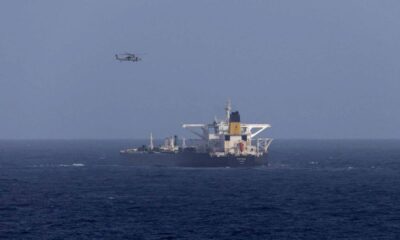
 Politics1 week ago
Politics1 week agoUS intercepts oil tanker off Venezuelan coast, Reports
-

 Sports1 week ago
Sports1 week agoPatriots vs. Ravens (Dec 21, 2025) Live Score – ESPN
-

 Business1 week ago
Business1 week agoNeptune Logitek Shares List At 26% Discount, IPO Investors Suffer Nearly Rs 30,000 Losses
-

 Entertainment1 week ago
Entertainment1 week agoDave Chappelle marks another milestone with unexpected Netflix debut
-

 Sports1 week ago
Sports1 week agoWATCH: Pakistan’s winning moment as Green Shirts clinch U19 Asia Cup title
-

 Entertainment1 week ago
Entertainment1 week agoPentatonix sings “Christmas Time Is Here”
-
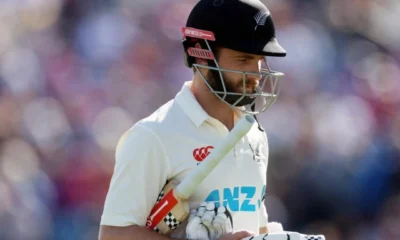
 Sports1 week ago
Sports1 week agoWilliamson opens up about New Zealand future | The Express Tribune






